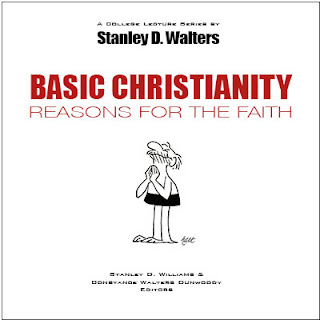Lectures on the Evidence for the Authenticity of BASIC CHRISTIANITY by Stanley D. Walters, Ph. D. is a book I'm editing for distribution by Nineveh's Crossing or a more prominent publisher.
My wife, Pam, and I had the privilege of sitting under Dr. Walters at Greenville College (now Greenville University) in 1967 and 1968 for a course he designed titled BASIC CHRISTIANITY. His influence on our Christian faith was remarkable. And although he was "technically" evangelical and an ordained Free Methodist minister, Pam and I credit him as a significant reason we converted to Catholicism.
There are 32 lectures that are currently being edited, from recordings I made in 1968, the last time he delivered the course. Walters academic pedigree began at Greenville College where he earned his B.A. He then went on to Asbury Theological Seminary (B.D.), Princeton (Th.M.), and Yale (Ph.D.) where is studied archeology and translated cuneiform tablets.
Although Greenville was associated with the evangelical Methodist tradition (and Armenian in theology), Walters had a liking for the discipline displayed by Anglican theologians like John Stott, C.S. Lewis, and other British thinkers and historians such as Plymouth Brethern F. F. Bruce and Quaker Elton Trueblood. To further broaden his theological resume he spend years after academia ministering in Presbyterian (Calvinism) parishes in Canada and the U.S.
As will be evident from the lectures, he was not a "faith alone" advocate, but lectured heavily in favor of "faith and reason." He preferred critical evidence to blind ideology. The training we received to think critically about religious ideas and our faith focused on the logical, historical, and personal religious experience as empirical evidence that verified Scripture revelation. Such evidence, we discovered, could not be denied and could be repeated.
So, without more at this point, the following posts will offer up excerpts of the lectures to tease you enough that you'll want to buy the book when it comes out...and when that is we have no idea. There's much work that remains. Except the first few lectures I may post in their entirety. (Stan Williams)
Lecture 1 - The Goals of This Course
Stanley D. Walters, Ph. D.
February 1968 - Greenville College
The BOP Method
Now there are different ways of convincing people that certain things are so. There is the “BOP” method which is often employed here. As a result of the application of this technique, you end up believing things which are completely unrealistic. Further, you end up...

